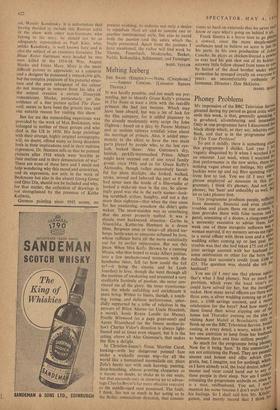Melting Iceberg THE SWAN. (Empire.)—NANA. (Cinephone.) —JOHNNY CONCHO. (Leicester Square
Theatre.) IT was hardly possible, and not much use pre- tending, not to identify Grace Kelly's princess in 7'/re Swan at least a little with the real-life princess she had just become. Which may have been absurd, but was a bit of luck for the film company, for it added piquancy to the already moderately witty script (by John Dighton : based on a play by Fercnc Molnar) and to various (always tasteful) jokes about the marriage of princes. Also, it added enor- mously to the effect to have the two main parts played by people who, to the last eye- lash, looked them : Alec Guinness's dry, baldish, perkily-moustached Prince Albert might have stepped out of any royal family group, circa 1910, and as for Grace Kelly's Alexandra, though rather excessively beauti- ful for plain daylight, she looked, walked, spoke, moved and • behaved the part as if she had never seen the inside of a film-studio or looked a make-up man in the eye, So alarm- ingly good was she in the early scenes—look- ing scrubbed, artless, haughty, and not a day more than eighteen—that when the time came for her awakening, somehow she didn't quite waken. The snow-maiden was so convincing that she never properly melted. It was a classic. even hackneyed, situation : Garbo in Ninotchka, Katherine Hepburn in a' dozen films, Bergman once or twice—all played ice- bergs. battle-axes or amazons softened by love. whose radiance burst all the more ecstatically out for its earlier suppression. But not this Swan. When Miss Kelly, thrown by a cunning Mama, who thus hoped to make Albert jealous. into a few unchaperoned moments with the handsome tutor, fell (as how could she fail to?—it being the cinema and he Louis Jourdan) in love, though she went through all the motions of awakening and presented a very creditable facsimile of passion. she never con- vinced me of the glory. the inner transforma- tion, the whole unfolding and enrichment it must bring. Within its limits, though, a touch- ing. young- and delicate performance, splen- didly supported by a tribe of relatives in the persons of Brian Aherne (as Uncle Hyacinth, a monk), Jessie Royce Landis (as Mama), Estelle Winwood (as a gaga great-aunt) and Agnes Moorehead (as the future mother-in- law). Charles Vidor's direction is always light- footed and at times even elegant, but it is the acting, above all Alec Guinness's, that makes the film a delight.
In Christian-Jaque's Nana, Martine Carol, looking—with her dangerous pointed face under a wickedly orange wig—for all 'the world like a humanised marmalade cat, plays Zola's hectic tart with such heaving, panting, deep-breathing, almost grunting eloquence as is meant, no doubt. to shake us to our souls, but that succeeds only in showing up to advan- tage Charles Boyer's far more effective restraint as the middle-aged man possessed. The fault, I think, lies not so much in her acting as in the flashy, ostentatious direction, that conceit- trates so hard on externals that we never reaill know or care what's going on behind it all., Frank Sinatra is a brave man to go plat a coward, since the more simple-min audiences tend to believe an actor is just ,c1.4 his parts. In his own production of Johnil., Conch°, he plays as chicken-livered a cowbc! as ever had his gun shot out of its holster,: scrawny little fellow chased from town to tows by hatred of the dead brother under 0°4 protection he sponged royally on everyone '" years: an uncomfortably authentic Pei'
formance. Director : Don McGuire. re
JSABEL QUI










































 Previous page
Previous page